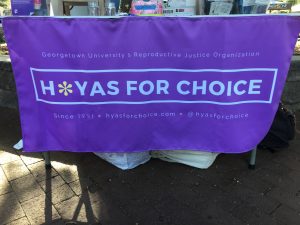Jan. 20 was the 25th anniversary of the Cardinal O’Connor Conference on Life (OCC), but notably, Copley and Healy lawns were empty of the usual pro-choice counterprotest organized by H*yas for Choice (HFC). Instead, HFC and Georgetown University College Democrats (GUCD) hosted a panel to discuss reproductive justice on Jan. 17, three days before OCC—an intentional shift in the organization’s programming focus.
In past years, HFC has protested on the day of the conference, and drafted a “No Donation Pledge” which demanded contraception access, university funding for pro-choice student organizations, and an end to the conference. They also published an editorial in 2021 explaining the conference’s problematic history and calling for an overhaul of its name, speakers, and mission.
“I think there was sort of a general consensus this year that we’ve been protesting a lot. The past several years we’ve done protests and just screaming, and everyone’s kind of tired of it because it’s screaming to no avail,” Sydney Hudson (SOH ’26), HFC co-president, said. “We realized that since the university is adamant that they do not support our mission generally and specifically in regards to our qualms with COCC, it would be more productive to turn our efforts towards positive change.”
HFC is emphasizing educational programming, rather than direct protest, as part of this strategy. “Namely, education and advocacy events have become our main focus. This semester, we are working on birth control and sexual health resource accessibility, menstrual equity and empowerment, and many others,” Hudson said.
The panel held shortly before OCC, titled “Reproductive Rights in 2024,” is part of HFC’s new focus on education. There were five speakers, four of whom were Georgetown alumni. Kat Scarborough (CAS ’26), director of contraception and tabling at HFC, introduced each of the panelists: Erin Matson (COL ’02), president & CEO at Reproaction, a reproductive justice advocacy group; Kayla Edwards Friedland (COL ’22), a former organizer of the Black Survivors Coalition; Angela Maske (SOH ’19, GHD ’20), former HFC co-president and strategic projects manager at Advocates for Youth, an advocacy group for inclusive sex education and universal sexual health services; Gillian Branstetter, communications strategist at the ACLU; and Dr. Christina Marea (SFS ’02), an assistant professor in Georgetown’s School of Nursing.
“We respect the fact that Right to Life can put on this event and amplify the voices that they want to, but they’re not going to do that without us also uplifting people who we believe represent this community, represent Georgetown, because Georgetown is a lot more than what their event portrays it to be,” Karenna Warden (CAS ’25), HFC co-president, said.
The panel discussed reproductive justice organizing as an expansive and intersectional issue, encompassing topics beyond abortion access, such as healthcare equity, inclusive sexual education, and domestic violence prevention. Marea situated reproductive justice as a racial and economic issue, showcasing how restrictions on abortion access worsen healthcare nationwide. Branstetter highlighted the national spike in anti-queer and anti-trans legislation, describing how ultra-right political groups are training lawyers to codify white Christian nationalist beliefs.
Friedland reflected on her activism as a Black, low-income student at Georgetown. In February 2020, she helped organize a multi-day sit-in in President DeGioia’s office as a member of the Black Survivors Coalition to demand improved sexual assault resources for Black, femme, and nonbinary-identifying survivors.
Friedland’s words seemed to resonate with the attendees. She discussed how college campuses are environments ripe for activism because students live close to one another and the administrators in power, which propels movement-building in ways that can be difficult after graduation.
Attendees expressed optimism after the panel, highlighting student hope for greater reproductive rights and justice, despite Georgetown’s pro-life position. As a Catholic and Jesuit institution, Georgetown does not offer condoms, lube, Plan B, hormonal birth control, or other items for contraceptive purposes at the Student Health Center, and the medical center does not perform abortions.
While the panel was held in the same week as the OCC, HFC and GUCD members focused on promoting education and discussion about reproductive justice, rather than protesting the pro-life conference itself.
“I think the way that it looked ended up seeming like we were, like, purposefully shifting away from protesting COCC. And what really happened was that our resources were just limited, and we poured all of our energy into planning that panel around COCC,” former HFC co-president Soraya Bata (SFS ’24) said. “It definitely wasn’t a mindset that dismisses the value of protesting.”
In their Jan. 13 newsletter, HFC described their plans to platform reproductive justice advocates—off-campus professionals and student activists alike—“to bring light to their work, their feelings, and their experiences.” HFC also planned an open mic for the night of Jan. 20, the day of the OCC conference, but later canceled that event.
According to the HFC board, their focus on education will enable them to engage with more aspects of reproductive justice work beyond abortion access, such as queer-inclusive sex education, healthy relationship strategies, reproductive health care management, and more. “Reproductive justice is so important because it includes abortion rights and because it addresses so many basic human rights that specifically abortion rights advocacy doesn’t always touch on,” Bata said.
HFC has always believed reproductive justice is broader than solely focusing on abortion access, and channeling their efforts into educational programming allows them to provide products and services that address a range of reproductive justice needs.
Complementing this educational programming, HFC plans to expand its birth control initiative that provides safe, reliable, and accessible birth control for any GU student. HFC will also continue its domestic violence prevention programming and plans to start more menstrual equity work this semester.
“We have found that education is one of our best resources because it empowers people to seek out their own needs and spread awareness independently,” Hudson said. “We aim to fill the gap in support and information that the university provides.”






